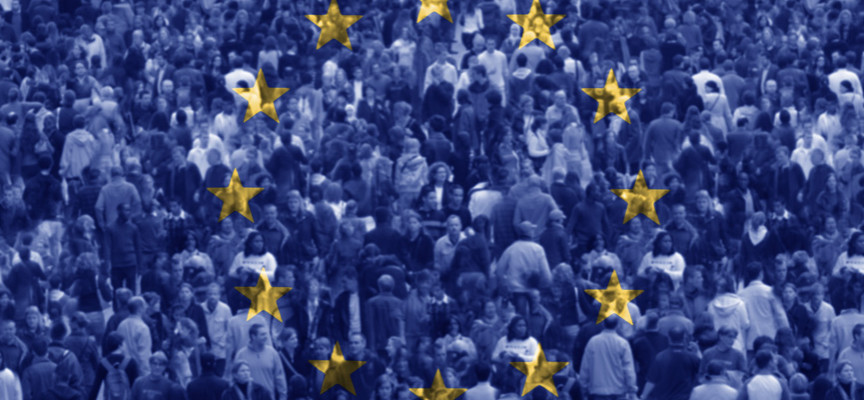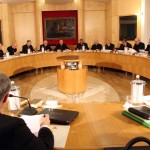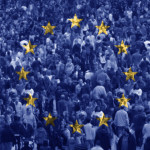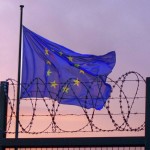These were the promises. So what has happened? All these things were introduced. Proof of this lies in empirical data. But it only corresponds to half the truth. Our part of the world lives in comparative luxury. But the other half of the truth is that these achievements are now beginning to crumble, not so much through the fault of Brussels, but rather because of the selfishness and negligence of people, groups and nation states.
Loss of order
The old (sometimes romantically imagined) order of peoples, groups and nation states has broken down, but a new spiritual order has not yet moved in to replace it: we live in an “interregnum” of fragility, liquidity, ambivalence. Within this vacuum, authoritarian movements have come to the fore.
Firstly, the breakdown of the “canopy” of common values means that people are becoming more insecure. They are on the quest for a “Cosmos”: a unified, consistent constellation of values. A source of meaningfulness is needed: unity of standards has for a long time been determined by religion, then by nationalism, and finally by rationalism and modern ideologies such as Marxism. The weakening of such systems of meaningfulness has for a long time been bridged by affluence and consumption: people who buy from one another are hardly likely to shoot each other. But it appears this is not enough in the long-term, especially when cracks begin to show in the promised growth in affluence. The authorities are promising a restoration of the “right” values, using methods that usually lie far apart from those values. But in a pluralised and individualised society, it is impossible to have a mutual value system, or a comprehensive culture of leadership or a system of socially-oriented attitudes.
Secondly, people have tribal instincts: a desire to belong, nostalgia for a homeland, a nation. They search for a feeling of community, the sources of which are dwindling, and they seek integration and inclusion; but the groups are in a state of flux. Nationalism, too, is nothing more than a bigger version of “tribal thinking”, maybe the biggest possible (which would make Europe impossible as an object of identification). Authorities promise the restoration of the “tribe”, a closing off from those outside, the reconstruction of a state completely contained by a closed border, the elimination of everything foreign.
Thirdly, people no longer know what is happening. The lack of transparency in all areas of life has become a strain – stressful and overtaxing. The world is strange, everywhere they look. The answer to what can be done always seems to get tangled up in complexity. The authorities promise the simple solutions: the leaders, who after all originate from the “substance of the people”, will slash through the Gordian knot. But there are no Gordian knots any more; if there were, the people involved wouldn’t find them, and if they did, they would have no swords to slice through them.
Fourthly, everything builds up gradually into a scenario of fear. Everything becomes uncertain, from life at home right out to the whole world. Fear is the universal reaction, especially when the very material basis begins to totter. Only authoritarians dare to promise security. There would be no problem if only the guilty parties could be named… Everything can be made good again: a community of “us” versus “them”; mob rule; fear turning into hatred.
What can we do?
People do not enact tax laws with their hand on the Bible, but as a responsible person, a European, a Christian. Let us do what we have to do, but do it decently.
Firstly, we should not abandon common sense. We should avoid succumbing to euphoria or panic. We should not act like “celebrities” by putting ourselves under the spotlight. Nor should we crawl away into a corner as if hounded. We should keep cool – very cool.
Secondly, we have to cling to the belief that every person has the freedom to act, that they are not merely a bundle of social influences, that they are indeed responsible for their own lives. They should not “dumb down” their lives as self-styled victims or the opposite, jokers, but should “get a grip” on their lives.
Thirdly, people should pursue their own religion while also caring for their “neighbours”, the majority of whom, after all, have the same spiritual roots. Doctrinal teachings are open to interpretation, and they need to be capable of alignment with social configurations. When talking to representatives or followers of other religions, it need not always come down to questions of dogma.
Fourthly, it is important to be able to work out a scale of feasibility. Anyone can wish for or ask for something, but that is a cheap transaction. It is much harder to cultivate tenacity through sharing expertise and willingness to compromise, using sound judgement and reflection, to broaden the scope of what is feasible into the realm of what is desirable.
Fifthly, people should not be fearful. Christianity, Judaism and Islam all refer to God’s trust in people. Whatever happens in this world, we should not be prey to fear.
Manfred Prisching
Professor of Sociology at the University of Graz
(source: Europeinfos #201; translated from the original text in German)
Il vecchio ordine si è perso
Il vecchio ordine (derivante in parte da una fantasia romantica) di popoli, gruppi e Stati si è frantumato; un nuovo ordine spirituale non lo ha ancora sostituito: “interregno”, fragilità, liquidità, ambivalenza. I movimenti autoritari si fanno strada in uno spazio rimasto vuoto.
Primo: le persone sono confuse dalla spostamento del “baldacchino” dei valori comuni. Cercano il “cosmo”: una costellazione di valori uniformi e coerenti. Dobbiamo trovare una fonte da cui attingere un senso, qualsiasi esso sia: l’unità normativa è stata data per lungo tempo dalla religione, poi dal nazionalismo, infine dal razionalismo e dalle ideologie moderne come il marxismo. Il fallimento di questi sistemi di rappresentazione per un certo tempo ha potuto essere compensata dalla prosperità e dal consumo: gli uomini che comprano non combattano. Ma nel lungo periodo, non sembra più bastare, specialmente quando la crescita promessa comincia a non funzionare più. Gli autoritaristi promettono il ripristino dei valori “veri” usando mezzi che normalmente ne sono molto distanti. Ma in una società divenuta pluralistica e individualista, non ci può essere alcun “cielo” di valori comuni, nessuna cultura di riferimento globale, né alcuna etica della virtù sociale.
Secondo: gli uomini accarezzano sentimenti tribali: il desiderio di appartenenza, la patria, la nazione. Sono alla ricerca di un senso di appartenenza comunitaria le cui fonti sono prosciugate; aspirano a una integrazione a una incorporazione, ma non trovano che gruppi fluttuanti. Anche il nazionalismo non è altro che una forma allargata di “tribalismo”, forse la più ampia possibile (tale per cui l’Europa, come oggetto di identificazione, non sarebbe possibile). Gli autoritaristi promettono il ristabilimento della “razza”, il ritiro entro i confini, la ricostruzione di uno stato sigillato, l’eliminazione di tutto ciò che è straniero.
Terzo: gli uomini non si ritrovano più. L’opacità in tutti i settori della vita comincia a pesare: stress e superlavoro. Il mondo è ovunque estraneo. Il che cosa fare sembra definitivamente perso nella complessità. Gli autoritaristi promettono soluzioni semplici: la figura del leader, originato dalla “sostanza del popolo”, taglia il nodo gordiano. Ma non c’è più il nodo gordiano; e se ci fosse, gli interessati non lo troverebbero; e se lo trovassero, non avrebbero la spada per tagliarlo.
Quarto: tutto ciò si compatta in un paesaggio d’angoscia. L’incertezza sovrasta lo spazio della vita privata e il mondo intero. La paura è la reazione universale, soprattutto quando le fondamenta materiali vacillano. Solo gli autoritaristi promettono la sicurezza. I problemi non esistono più quando si può puntare ai colpevoli e solo a loro… Tutto poi torna in ordine: la comunità, generando un nemico comune; la mobilitazione di massa; la trasformazione della paura in odio.
Che fare?
Non si fa una legge fiscale con la Bibbia in mano, ma la si fa come persone responsabili, come europei, come cristiani. Si faccia ciò che è necessario in modo corretto.
In primo luogo, non perdere il buon senso. Non cedere all’euforia e nemmeno al panico. Non mettere il proprio ego davanti a tutto né ritirarsi in un angolo. Mantenere una buona dose di sangue freddo.
In secondo luogo, credere fermamente che ogni uomo ha la libertà di agire, che non è solo un giocattolo alla mercé di influssi sociali, ma che ha una responsabilità nell’esistenza. Non vivere la propria vita come un automa, presentandosi come una vittima o come uno spettatore, ma dirigerla.
In terzo luogo, preoccuparsi per la propria religione, ma anche prendersi cura dei “vicini” le cui radici spirituali sono in gran parte le stesse. Le credenze possono essere interpretate, e devono essere collegate a configurazioni sociali. Con dei rappresentanti o dei credenti di altre religioni, non è necessario parlare sempre di questioni dogmatiche.
Quarto, valutare il grado di fattibilità. È facile desiderare o esigere qualcosa. È molto più difficile mostrare perseveranza per riuscire ad ampliare noi stessi, con competenza e in spirito di compromesso, con discernimento e persistenza, lo spazio del possibile nello spazio del desiderabile.
In quinto luogo, non avere paura. L’ebraismo, il cristianesimo e l’Islam sono un richiamo alla fede di Dio nell’uomo. Qualunque cosa accada qui, non bisogna avere paura.
Manfred Prisching
professore di sociologia alla Karl-Franzensuniversität di Graz
(fonte: Europeinfos #200; versione originale dell’articolo in tedesco; traduzione italiana a cura di Eurcom)
Nicht so sehr durch das Verschulden Brüssels
Seinerzeit, als es um Schritte zur Europäischen Union ging, gab es eine ganze Reihe von Versprechungen. Die Vereinigung würde den Frieden sichern, die Union ausweiten. Es würden durch die Regionalförderung benachteiligte Gebiete profitieren. Man könnte die Durchlässigkeit der Grenzen erhöhen, damit den Handel fördern und Produkte günstiger machen. Man würde die Bürokratie reduzieren, Impulse für das Wirtschaftswachstum setzen und damit die Arbeitsmarktbedingungen verbessern. Die Menschen könnten frei durch Europa reisen, ohne Hemmnisse an den Grenzen und ohne den Aufwand steten Geldwechsels.
Das alles waren die Versprechungen. Und was ist geschehen? Alles das ist eingetreten. Das lässt sich mit empirischen Daten belegen. Und es ist die halbe Wahrheit. Wir sind in der Luxusecke der Welt. Doch die andere Hälfte der Wahrheit ist, dass diese Errungenschaften nun zu bröckeln beginnen, gar nicht so sehr durch das Verschulden Brüssels, sondern durch Eigensucht und Leichtsinn von Personen, Gruppen und Staaten.
Ordnungsverlust
Die alte (teils romantisch imaginierte) Ordnung der Völker, Gruppen und Staaten ist zerbrochen, eine neue geistige Ordnung ist noch nicht an ihre Stelle getreten: „Interregnum“, Fragilität, Liquidität, Ambivalenz. In dieses Vakuum dringen autoritäre Bewegungen vor.
Erstens: Die Menschen sind durch die Auflösung des „Baldachins“ der gemeinsamen Werte verunsichert. Sie suchen das Kosmion: eine einheitliche und konsistente Wertekonstellation. Es braucht irgendeine Sinnstiftungsquelle: Normative Einheit wurde lange Zeit durch die Religion hergestellt, dann durch Nationalismus, schließlich durch Vernunftglauben und moderne Ideologien wie den Marxismus. Das Schwächeln solcher Sinnstiftungssysteme kann eine Zeitlang durch Wohlstand und Konsum überbrückt werden: Menschen, die kaufen, schießen nicht. Aber auf Dauer scheint das nicht zu genügen, besonders wenn es mit dem versprochenen Wohlstandszuwachs zu hapern beginnt. – Die Autoritären versprechen die Wiederherstellung der „richtigen“ Werte, auf Wegen, die üblicherweise in Regionen weit jenseits dieser Werte liegen. Aber in einer pluralisierten und individualisierten Gesellschaft kann es keinen gemeinsamen Wertehimmel geben, keine umfassende Leitkultur oder gesellschaftliche Gesinnungslehre.
Zweitens: Menschen hegen tribalistische Gefühle: Sehnsucht nach Zugehörigkeit, Heimat, Nation. Sie suchen nach einem Gemeinschaftsgefühl, dessen Quellen versiegt sind, sie streben Einbindung und Einbettung an; aber da sind nur noch fluktuierende Gruppen. Auch der Nationalismus ist nichts anderes als eine groß geratene Form von „Stammesdenken“, vielleicht die größtmögliche (so dass Europa als Identifikationsobjekt nicht mehr möglich wäre). – Autoritäre versprechen die Wiederherstellung des „Stammes“, den Abschluss nach außen, die Rekonstruktion staatlicher Container, die Eliminierung alles Fremden.
Drittens: Die Menschen kennen sich nicht mehr aus. Die Unüberschaubarkeit in allen Lebensbereichen ist belastend geworden: Stress und Überforderung. Die Welt ist fremd, an allen Ecken. Was zu tun wäre, scheint sich allemal in der Komplexität zu verheddern. – Die Autoritären versprechen die einfachen Lösungen: Die Führungsgestalt, die ja aus der „Substanz des Volkes“ kommt, zerschlägt den gordischen Knoten. Doch es gibt keine gordischen Knoten mehr; wenn es welche gäbe, würden die Akteure sie nicht finden; wenn sie sie fänden, hätten sie keine Schwerter.
Viertens: Alles kumuliert sich zu einer Szenerie der Angst. Alles wird unsicher, vom persönlichen Lebensbereich bis zur ganzen Welt. Angst ist die universelle Reaktion, besonders dann, wenn selbst die materiellen Grundlagen ins Wanken kommen. – Nur die Autoritären versprechen Sicherheit. Da gibt es keine Probleme, wenn man nur die Schuldigen benennen kann. … Alles ließe sich wieder gut machen: Gemeinschaft durch Feinderzeugung. Folgebereitschaft im Mob. Angst in Hass transformieren.
Was ist zu tun?
Man macht kein Steuergesetz mit der Bibel in der Hand, aber man macht es als verantwortliche Person, als Europäer, als Christ. Man tue das Nötige, mit Anstand.
Erstens den gesunden Menschenverstand nicht verlieren. Ebenso wenig in Euphorie wie in Panik verfallen. Ebenso wenig sich narzisstisch in den Mittelpunkt spielen wie komplexhaft in die Ecke verkriechen. Eine gute Portion Gelassenheit pflegen.
Zweitens am Glauben festhalten, dass jeder Mensch die Freiheit zum Handeln hat, dass er nicht einfach ein Bündel gesellschaftlicher Einflussfaktoren ist, dass er deshalb auch eine Verantwortung im Dasein hat. Sein Leben nicht „herunterleben“, als stilisiertes Opfer oder als Spaßhaber, sondern sein Leben „führen“.
Drittens sich um die eigene Religion, aber auch um die „Nachbarn“ kümmern, die doch zum größeren Teil aus denselben geistigen Wurzeln kommen. Glaubenslehren sind interpretierbar, und sie sind an gesellschaftliche Konfigurationen anschlussbedürftig. Nicht immer muss es gleich um Dogmenfragen gehen, wenn man mit Vertretern oder Anhängern anderer Religionen spricht.
Viertens Dimensionen der Machbarkeit abschätzen können. Man kann sich allemal etwas wünschen oder einfordern, aber das ist ein billiges Geschäft. Viel schwieriger ist es, die Zähigkeit aufzubringen, mit Sachverstand und Kompromissbereitschaft, mit Augenmaß und Nachhaltigkeit den Raum des Machbaren auszuweiten, hinein in den Raum des Erwünschten.
Fünftens keine Angst haben. Christentum, Judentum und Islam verweisen auf das Vertrauen Gottes zum Menschen. Was immer auf dieser Welt geschieht, man sollte sich nicht fürchten müssen.
Manfred Prisching
Professor für Soziologie an der Karl-Franzensuniversität Graz
(quelle: Europeinfos #200)
Non pas tellement par la faute de Bruxelles
Sur le parcours historique qui a conduit à l’Union européenne, les promesses ont été nombreuses. L’unification garantirait la paix, étendrait l’Union. Les régions défavorisées bénéficieraient du développement régional. On pourrait rendre les frontières plus perméables et ainsi favoriser les échanges et la baisse des prix des produits. On réduirait la bureaucratie, on stimulerait la croissance économique et on améliorerait l’accès au marché du travail. Les personnes voyageraient librement dans toute l‘Europe, sans barrières dressées aux frontières et sans l’inconvénient de devoir changer en permanence les devises.
Tout cela, c’étaient les promesses. Et qu’est-il arrivé? Tout cela s’est produit. Les données empiriques le prouvent. Et c’est la moitié de la vérité. Notre coin de monde est une oasis de luxe. Mais l’autre moitié de la vérité, c’est que ces réalisations commencent à s‘effriter, non pas tellement par la faute de Bruxelles, mais à cause de l’égoïsme et de l’inconscience de personnes, de groupes et d’États.
Le vieil ordre s’est perdu
Le vieil ordre (relevant en partie d’un imaginaire romantique) des peuples, des groupes et des États s’est brisé, un nouvel ordre spirituel ne s’est pas encore substitué à lui: «interrègne», fragilité, liquidité, ambivalence. Les mouvements autoritaires se frayent un chemin dans l’espace vacant.
En premier lieu: les personnes sont désorientées par la dislocation du «dais» des valeurs communes. Elles recherchent le «cosmion»: une constellation de valeurs uniforme et cohérente. Il faut trouver une source à laquelle puiser du sens, quelle qu’elle soit : l’unité normative a longtemps été donnée par la religion, puis par le nationalisme, enfin par le rationalisme et des idéologies modernes telles que le marxisme. La défaillance de ces systèmes de représentation a pu, pendant un certain temps, être compensée par la prospérité et la consommation: les hommes qui achètent ne se battent pas. Mais, à la longue, cela ne semble pas suffire, en particulier lorsque la croissance promise commence à ne plus fonctionner. – Les autoritaristes promettent la restauration des «vraies» valeurs par des voies qui, d’ordinaire, passent par des moyens bien éloignés de celles-ci. Mais, dans une société devenue pluraliste et individualiste, il ne peut exister aucun « ciel» de valeurs communes, aucune culture de référence globale ni aucune éthique de la vertu sociale.
En deuxième lieu: les hommes caressent des sentiments tribaux: désir d’appartenance, patrie, nation. Ils sont à la poursuite d’un sentiment d’appartenance communautaire dont les sources sont taries, ils aspirent à une intégration, une incorporation; mais ne trouvent là que des groupes fluctuants. Même le nationalisme n’est rien d’autre qu’une forme étendue de «tribalisme», peut-être la plus large possible (de sorte que l’Europe, comme objet d’identification, ne fonctionne plus). – Les autoritaristes promettent le rétablissement de la «race», le retrait en-deçà des frontières, la reconstruction d‘un État étanche, l’élimination de tout ce qui est étranger.
En troisième lieu: les hommes ne s’y retrouvent plus. L’opacité dans tous les domaines de la vie commence à peser: stress et surmenage. Le monde est partout étranger. Ce qui serait à faire semble, une fois pour toutes, se perdre dans la complexité. – Les autoritaristes promettent les solutions simples: la figure du leader, qui proviendrait de la «substance du peuple», tranche le nœud gordien. Mais il n’y a plus de nœud gordien; si c’était le cas, les intéressés ne le trouveraient pas; s’ils le trouvaient, ils n’auraient pas de glaive pour le trancher.
Quatrièmement: tout cela se presse dans un paysage d’angoisse. L’incertitude plane, sur l’espace de la vie privée et sur le monde entier. La peur est la réaction universelle, surtout lorsque les bases matérielles vacillent. – Les autoritaristes seuls promettent la sécurité. Les problèmes n’existent plus quand on peut montrer du doigt des coupables, et eux seuls… Tout revient alors dans l‘ordre: la communauté, en générant un ennemi commun; la mobilisation de masse; la transformation de la peur en haine.
Que faire?
On ne fait pas une loi fiscale la Bible à la main, mais on la fait en personne responsable, en Européen, en chrétien. Que l’on fasse le nécessaire de façon correcte.
Premièrement, ne pas perdre le bon sens. Ne pas céder à l’euphorie pas plus qu’à la panique. Ne pas mettre son ego en avant ni raser les murs. Garder une bonne dose de sang-froid.
Deuxièmement, croire fermement que chaque homme a la liberté d’agir, qu’il n’est pas simplement le jouet d’influences sociales, mais qu’il a une responsabilité dans l‘existence. Ne pas vivre machinalement sa vie, en se présentant en victime ou en jouisseur, mais la diriger.
Troisièmement, avoir le souci de sa propre religion, mais aussi prendre soin des «voisins» dont les racines spirituelles sont, en majeure partie, les mêmes. Les croyances peuvent être interprétés, et elles doivent être rattachées à des configurations sociales. Avec des représentants ou des croyants d’autres religions, il n’est pas nécessaire de toujours parler de questions de dogme.
Quatrièmement, pouvoir évaluer les degrés de faisabilité. Il est facile de désirer ou exiger quelque chose une fois pour toutes. Il est bien plus difficile de faire preuve de persévérance en ouvrant soi-même l’espace du possible dans l’espace du souhaitable, avec compétence et dans un esprit de compromis, avec discernement et persistance.
Cinquièmement, ne pas avoir peur. Le judaïsme, le christianisme et l’islam sont un rappel de la foi de Dieu en l’homme. Quoiqu’il arrive ici-bas, on ne devrait pas avoir peur.
Manfred Prisching
professeur de sociologie à la Karl-Franzensuniversität Graz.
(source: Europeinfos #200)
Latest posts by Eurcom (see all)
- For a more social Europe - 15 febbraio 2017
- Not so much through the fault of Brussels - 7 febbraio 2017











